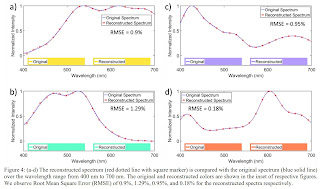"Emerging applications in biomedical and communication fields have boosted the research in the miniaturization of spectrometers. Recently, reconstruction-based spectrometers have gained popularity for their compact size, easy maneuverability, and versatile utilities. These devices exploit the superior computational capabilities of recent computers to reconstruct hyperspectral images using detectors with distinct responsivity to different wavelengths. In this paper, we propose a CMOS compatible reconstruction-based on-chip spectrometer pixels capable of spectrally resolving the visible spectrum with 1 nm spectral resolution maintaining high accuracy (>95 %) and low footprint (8 um x 8 um), all without the use of any additional filters. A single spectrometer pixel is formed by an array of silicon photodiodes, each having a distinct absorption spectrum due to their integrated nanostructures, this allows us to computationally reconstruct the hyperspectral image. To achieve distinct responsivity, we utilize random photon-trapping nanostructures per photodiode with different dimensions and shapes that modify the coupling of light at different wavelengths. This also reduces the spectrometer pixel footprint (comparable to conventional camera pixels), thus improving spatial resolution. Moreover, deep trench isolation (DTI) reduces the crosstalk between adjacent photodiodes. This miniaturized spectrometer can be utilized for real-time in-situ biomedical applications such as Fluorescence Lifetime Imaging Microscopy (FLIM), pulse oximetry, disease diagnostics, and surgical guidance."



No comments:
Post a Comment
All comments are moderated to avoid spam and personal attacks.